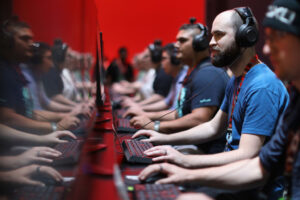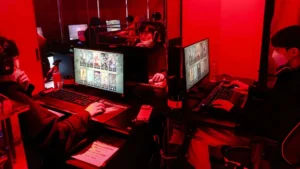Now, you might be wondering, Does Lethal Company have anti-cheat measures in place? It’s a question that resonates deeply with any gamer who values integrity and equality on the digital battlefield. Let’s embark on a journey to uncover the truth behind Lethal Company’s stance on anti-cheat mechanisms and how they shape the gaming experience for its passionate community.
Yes, Lethal Company takes cheating seriously and has implemented a comprehensive anti-cheat system to ensure fair gameplay for all users. Through a combination of detection algorithms, server-side validation, and community reporting mechanisms, Lethal Company strives to maintain a level playing field where skill and strategy prevail.
So, rest assured, when you engage in the thrilling battles of Lethal Company, you’re entering a world where integrity and fair play are upheld. These measures are constantly evolving to stay ahead of new cheating techniques, ensuring that every match is a test of true skill and determination. So, whether you’re a seasoned veteran or a newcomer to the battlefield, Lethal Company welcomes you to a gaming experience where fairness and sportsmanship prevail.
Importance of Anti-Cheat Measures in Online Gaming

Anti-cheat measures play a crucial role in maintaining fairness, integrity, and overall enjoyment in online gaming. Here are several reasons why they are important:
- Preserving Fair Competition: Cheating gives unfair advantages to some players, disrupting the balance of the game and undermining the efforts of those who play by the rules. Anti-cheat measures help to level the playing field and ensure that victory is determined by skill, strategy, and effort rather than illicit means.
- Protecting Player Experience: Cheating can ruin the gaming experience for legitimate players. It leads to frustration, resentment, and a sense of unfairness, ultimately driving players away from the game. By preventing cheating, anti-cheat measures help maintain a positive and enjoyable environment for all participants.
- Safeguarding Game Economy: In games with virtual economies or in-game purchases, cheating can undermine the value of in-game items and currency. This not only affects the fairness of the game but also has economic implications for developers and players alike. Anti-cheat measures help protect the integrity of the game’s economy and ensure that players can trust the value of their investments.
- Preserving Reputation and Trust: Cheating tarnishes the reputation of a game and its developers, leading to negative publicity and a loss of trust among players. By actively combating cheating, developers demonstrate their commitment to fair play and the integrity of their game, fostering a positive reputation and building trust within the gaming community.
- Maintaining Competitive Integrity: In esports and competitive gaming, cheating can have serious consequences, including disqualification, bans, and damage to the integrity of the sport. Anti-cheat measures are essential for preserving the integrity of competitive events, ensuring that results are determined by skill and sportsmanship rather than cheating.
- Preventing Security Risks: Some cheats and hacks not only affect gameplay but also pose security risks to players’ accounts and personal information. Anti-cheat measures help protect players from potential breaches, safeguarding their privacy and ensuring a safe gaming environment.
- Supporting Long-Term Engagement: A game’s longevity and success depend on maintaining an active player base. Cheating drives legitimate players away, leading to a decline in engagement and revenue. By combating cheating, anti-cheat measures support long-term player retention and the continued success of the game.
Overall, anti-cheat measures are essential for promoting fairness, protecting player experience, preserving game integrity, and fostering a positive and sustainable gaming ecosystem.
Does lethal company have anti cheat?
Yes, it does. lethal Company’s anti-cheat system is a multi-layered approach designed to detect and deter cheating in all its forms. At its core, the system utilizes sophisticated algorithms and detection mechanisms that continuously monitor player actions, in-game statistics, and other relevant data points. These algorithms can flag suspicious behavior patterns indicative of cheating, such as aimbot usage, wallhacks, or unauthorized modifications to the game files.
In addition to automated detection methods, Lethal Company also employs human moderators and anti-cheat experts who manually review reported cases of suspected cheating. This combination of automated and manual oversight ensures that no cheating attempts slip through the cracks, and that any violations of fair play are swiftly addressed.
Moreover, Lethal Company encourages its community to actively participate in maintaining a cheat-free environment. Players are provided with tools to report suspected cheaters, along with clear guidelines on what constitutes cheating behavior. Reports submitted by players are carefully reviewed by the moderation team, further bolstering the effectiveness of the anti-cheat system.
Furthermore, Lethal Company regularly updates its anti-cheat measures to stay ahead of evolving cheating techniques and exploits. This proactive approach ensures that the game’s integrity is upheld, and players can enjoy a competitive yet fair gaming experience free from the frustrations of cheaters.
Common Types of Cheating in Online Gaming

Cheating in online gaming can take various forms, each aiming to give players an unfair advantage over their opponents. Some common types of cheating include:
- Aimbotting: Aimbotting involves the use of software that automatically aims weapons or abilities at opponents with unnatural precision. This gives cheaters an unfair advantage in accuracy and reaction time, often resulting in near-perfect shots.
- Wallhacking: Wallhacking allows players to see through solid objects, such as walls or terrain, giving them awareness of enemy positions and movements that would otherwise be hidden. This gives cheaters an unfair advantage in tracking and ambushing opponents.
- Speed Hacking: Speed Hacking involves manipulating the game’s mechanics to increase the player’s movement speed beyond normal limits. This enables cheaters to traverse the game world faster than intended, making them harder to hit and giving them an unfair advantage in engagements.
- Exploiting Glitches: Cheaters may exploit bugs or glitches in the game’s code to gain unintended advantages, such as clipping through walls, accessing restricted areas, or duplicating items. Exploiting glitches can disrupt game balance and fairness, leading to an unfair playing field.
- Use of Unauthorized Mods: Some players may use unauthorized modifications or “mods” to gain unfair advantages, such as enhanced visuals, increased weapon damage, or automated gameplay functions. These mods often violate the game’s terms of service and can result in unfair advantages for those who use them.
- Scripting: Scripting involves the use of automated scripts or macros to perform complex actions with precise timing, such as rapid firing, recoil compensation, or complex movement patterns. This gives cheaters an unfair advantage in gameplay mechanics that require manual skill and timing.
- Win Trading: In competitive multiplayer games, win trading occurs when players collude with each other to manipulate match outcomes, often by intentionally losing or conceding matches to boost each other’s rankings or rewards. This undermines the integrity of the game’s competitive ecosystem and unfairly benefits those involved.
Overall, these are just a few examples of the many ways in which cheating can manifest in online gaming. Combatting cheating requires a combination of robust anti-cheat measures, community vigilance, and developer support to maintain a fair and enjoyable gaming experience for all players.
Anti-Cheat Measures in Lethal Company
In Lethal Company, the developers have implemented a comprehensive suite of anti-cheat measures to maintain fairness and integrity within the game’s competitive environment. These measures include:
- Client-Side Detection: Lethal Company’s anti-cheat system actively scans players’ game clients for any signs of cheating software or unauthorized modifications. This includes detecting cheat programs injected into memory, modified game files, or other forms of tampering that could provide unfair advantages.
- Behavior Monitoring: The anti-cheat system continuously monitors player behavior in real-time to detect suspicious patterns indicative of cheating. This includes analyzing movement, aiming accuracy, reaction times, and other gameplay actions to identify anomalies that may suggest the use of cheats.
- Server-Side Validation: Lethal Company employs server-side validation to cross-reference player actions and validate their legitimacy. By comparing player inputs and outcomes across multiple clients, the game server can detect discrepancies that may indicate cheating.
- Heuristic Analysis: The anti-cheat system in Lethal Company utilizes heuristic analysis techniques to identify cheating behaviors based on predefined rules and algorithms. This involves analyzing player actions and comparing them against expected norms to flag deviations that may indicate cheating.
- Regular Updates: The developers of Lethal Company regularly update the game’s anti-cheat system to adapt to evolving cheating techniques and countermeasures. These updates include patches to address vulnerabilities, improvements to detection algorithms, and other enhancements to stay ahead of cheaters.
- Reporting Mechanisms: Lethal Company provides players with reporting mechanisms to report suspected cheaters. These reports are then reviewed by moderators or automated systems to investigate and take appropriate action against cheaters, such as temporary or permanent bans from the game.
- Community Engagement: The developers actively engage with the Lethal Company community to raise awareness about cheating and encourage players to report suspicious behavior. By fostering a collaborative approach to combating cheating, the game’s anti-cheat measures are strengthened through the collective efforts of players and developers alike.
The anti-cheat measures in Lethal Company are designed to create a level playing field where skill and fair competition prevail. By combining proactive detection methods, real-time monitoring, and community engagement, the developers strive to maintain a fair and enjoyable gaming experience for all players.
Functionality of Anti-Cheat
The functionality of anti-cheat systems in online gaming revolves around detecting and preventing cheating behaviors to maintain fair gameplay. Here’s how anti-cheat systems typically work:
- Behavior Monitoring: Anti-cheat systems monitor player behavior in real-time to detect suspicious patterns indicative of cheating. This includes analyzing movement, aiming, reaction times, and other gameplay actions to identify anomalies that suggest the use of cheats.
- Client-Side Detection: Anti-cheat software often runs on the player’s device (client-side) and actively scans the game environment for signs of cheating software or unauthorized modifications. This can include detecting cheat programs injected into the game’s memory, modified game files, or unusual network activity associated with cheats.
- Server-Side Validation: In addition to client-side detection, anti-cheat systems may also utilize server-side validation to cross-reference player actions and validate their legitimacy. By comparing player inputs and outcomes across multiple clients, server-side validation can detect discrepancies that may indicate cheating.
- Heuristic Analysis: Anti-cheat systems employ heuristic analysis techniques to identify cheating behaviors based on predefined rules and algorithms. This involves analyzing player actions and comparing them against expected norms to flag deviations that may indicate cheating.
- Anti-Cheat Updates: Anti-cheat systems are regularly updated to adapt to evolving cheating techniques and countermeasures. Developers release updates to their anti-cheat software to patch vulnerabilities, improve detection algorithms, and stay ahead of cheaters.
- Reporting and Player Feedback: Anti-cheat systems often incorporate reporting mechanisms that allow players to report suspected cheaters. These reports are then reviewed by moderators or automated systems to investigate and take action against cheaters accordingly. Player feedback and reports play a crucial role in identifying and addressing cheating incidents.
- Penalties and Enforcement: When cheating is detected, anti-cheat systems enforce penalties such as temporary or permanent bans from the game. These penalties serve as deterrents against cheating and help maintain a fair and competitive gaming environment for all players.
The functionality of anti-cheat systems is multifaceted, combining proactive detection methods, real-time monitoring, and player feedback to detect and deter cheating in online games. By continuously evolving and improving anti-cheat measures, developers strive to uphold the integrity and fairness of their gaming communities.
Challenges Faced by Developers in Implementing Anti-Cheat Measures

Developers face several challenges when implementing anti-cheat measures to maintain fair gameplay in online games. Some of these challenges include:
- Stay Ahead of Cheaters: Cheaters are constantly evolving their tactics and developing new cheating methods. Developers must continuously update and refine their anti-cheat systems to detect and prevent these evolving cheating techniques.
- Balancing Detection and Performance: Anti-cheat measures often require resources and processing power, which can impact game performance. Developers must strike a balance between effective cheat detection and maintaining smooth gameplay experiences for legitimate players.
- False Positives: Anti-cheat systems may sometimes flag legitimate players as cheaters, leading to false positives. Developers need to fine-tune their detection algorithms to minimize false positives while still effectively catching cheaters.
- Cat-and-Mouse Game: Cheaters often find ways to bypass anti-cheat measures, leading to a constant cat-and-mouse game between developers and cheaters. Developers must be vigilant and responsive in patching vulnerabilities and updating their anti-cheat systems to stay ahead of cheaters.
- 5. User Privacy Concerns: Some anti-cheat measures involve intrusive techniques such as scanning system files or monitoring user activity, raising privacy concerns among players. Developers must implement anti-cheat measures in a way that respects user privacy while still effectively detecting and preventing cheating.
- Resource Limitations: Smaller development teams or indie developers may lack the resources or expertise to develop and maintain robust anti-cheat systems. As a result, they may rely on third-party anti-cheat solutions or community moderation to address cheating issues.
- Community Backlash: Introducing strict anti-cheat measures or banning cheaters may sometimes result in backlash from the gaming community, especially if innocent players are mistakenly punished or if the anti-cheat measures are perceived as overly intrusive. Developers must carefully communicate their anti-cheat efforts and be transparent about their processes to maintain trust and support from the community.
Despite these challenges, implementing effective anti-cheat measures is crucial for maintaining the integrity and competitiveness of online games. By addressing these challenges proactively and iteratively improving their anti-cheat systems, developers can create fair and enjoyable gaming experiences for all players.
Conclusion
Lethal Company does indeed have robust anti-cheat measures in place. These measures, ranging from client-side detection to community engagement, demonstrate the developers’ dedication to maintaining fairness and integrity within the game.
With a comprehensive approach to combating cheating, Lethal Company ensures that players can compete on a level playing field, where skill and sportsmanship prevail. So, to answer the question, Does Lethal Company have anti-cheat? the answer is a resounding yes, reaffirming the commitment to a fair and enjoyable gaming experience for all.
